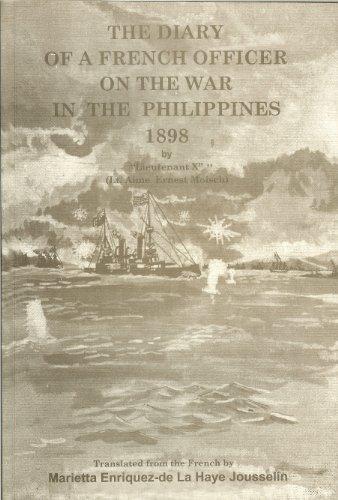Admiral Dewey informs the foreign battleships that they can anchor in their original positions in Manila Bay. The naval officers hastily go on land but the overly cautious Germans, heedless of the dispatches concerning the treaty, go ashore fully armed. On land or at sea, Admiral von Diederich’s presence reaffirms the dominance of a formidable Germany.
It is said the Spaniards lost 400 men in yesterday’s fighting. Even if it were 40 or a hundred, the toll would still be too high since these men, dispersed everywhere on the ramparts, awaited the enemy without fighting and were ordered not to fire a single shot. The Spanish soldiers within the walls hae already relinquished their guns unloaded and discharged, before they are allowed entry. Within the walls, an American officer piles up the confiscated guns in the guardhouse. I have also seen an infantry regiment and a battalion of soldiers disarmed before the city gates.
The Spanish soldiers keep their sabers and clench their teeth, perhaps out of rage or out of sheer humiliation. They undoubtedly harbor these feelings of betrayal in varying degrees, fully aware that there was no battle and that the troops present could have kept the Americans at bay.
Admiral Montojo has bluntly stated that the siege of Manila was a farce played by General Merritt. But he seems to forget that he also played a role similar to that of General Jaudenes and the Spaniards.
Now, Manila definitely looks like a conquered city. There is hardly any Spaniard on the street and all shops are closed. Panic is rising out of fear that the Tagals might pillage this city tonight or possible plan a massacre. Meanwhile, the Americans continue to exercise very strict surveillance.
Within the Walled City, the inhabitants and soldiers move around, and one can see the Spanish military men carrying on friendly conversations with the soldiers of the Union. Some are even drinking together in the cafes. What an encouraging sight! The streets are full of disarmed soldiers, but in the churches and convents, where the entire Spanish garrison is confined, the air is permeated by unbearable stench and dirt.
General Merritt has had a manifesto posted in English, Spanish and Tagalog declaring that Manila is now under American military government. There is no mention whatsoever of the insurgents. The American military is speaking on behalf of the United States in the same way that the Spaniards were speaking yesterday in the name of Spain, the repetition of this twist of fate clearly indicating the stranglehold of another foreign power on Manila.
A considerable number of American troops seen at close range show no signs of order, or discipline. It is obvious why the Germans look down disdainfully on them. They look like an army organized for manhunts, while the English marines remind me of a flotilla of yachtsmen. The Americans involved everywhere, just like their counterparts, the English, remain different from them, like the contrast between the rustic and aristocratic or between the workhand and the lord of the manor. The American army has always been regarded as a school for athletics, a notion that should be expanded to moral gymnastics or a virtual seminary for democracy.
The American soldiers are hefty and tall but appear narrow in the chest in relation to their height. It seems that tuberculosis is their Achilles heel. These men who exude self-confidence are more comfortable wearing cowboy outfits than the military uniform. Their huge felt hats resemble the plumed hats of musketeers in operettas. The color of their sporty brown uniform is very similar to that worn by our marine infantry. Some wear dark-blue tunics, which look too warm for the tropics. They all wear gaiters and belts of cartridges. During the day they are on their best behavior and pay for all their purchases. At night, they rid themselves of their inhibitions, drink excessively and, when quite drunk on whisky, become unbearable savages, killing at the slightest provocation. They do not unleash their brutish behavior on each other but rather on the natives. As soon as they see one, the manhunt begins. This sport enjoyed by these champions of humanity has been inherited from their forefathers, who pursued the Redskins and Negroes. This war has certainly given the Americans the opportunity for magnificent manhunts in the Philippines and Cuba at very little cost.
Rumors about the impropriety of this siege is spreading fast. It is said tha when General Jaudenes stated, On the presumption that Manila cannot defend itself, no cannons should be fired, only one general defiantly protested and said, When the hostilities start, we should fight to the bitter end!” Strong words spoken by a man who dared speak his mind at a time like this.
The Spaniards have convinced themselves that they had no other alternative, a convenient excuse for a well deserved defeat. Colonel ___________ now insists that the situation was inevitable, but vehemently denies that the Spanish artillerymen were inferior to their mediocre American counterparts. “In fact, most people are unaware that we used armor-piercing shells to destroy bridges and watchtowers. Let it not be said that our shells were useless. But when asked why the other types of missiles were not used, he had to admit that the Spanish officers had not been instructed on the use of the various projectiles.
